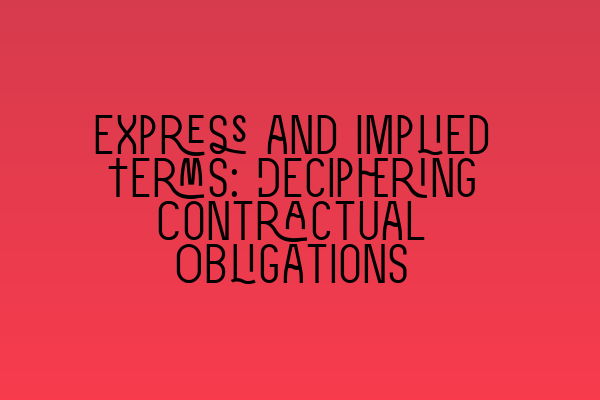Express and Implied Terms: Deciphering Contractual Obligations
Welcome to our blog post on the topic of express and implied terms in contract law. As solicitors, it is crucial for us to understand and interpret these contractual obligations in order to ensure the best outcome for our clients. In this article, we will explore the differences between express and implied terms, their significance in contract law, and how they impact legal practice and decision-making.
The Basics: Express Terms
Express terms are the specific provisions that parties include in a contract to define their rights and obligations. These terms can be oral or written, but it is always advisable to have written agreements to avoid any ambiguity or disputes. Express terms are crucial as they provide clarity and certainty to the parties involved.
Let’s consider a hypothetical case study to illustrate the importance of express terms. In a business partnership agreement, the partners may explicitly state the division of profits and responsibilities. These express terms can prevent disagreements and protect the interests of all parties involved. To gain deeper insights into real-life case studies involving express terms, check out our article on Unveiling Real-Life Case Studies: Insights into Legal Practice and Decision-Making.
The Implied Terms: Unspoken but Binding
Implied terms, on the other hand, are not explicitly stated in the contract but are nonetheless binding on the parties involved. These terms are implied by law, custom, or the intention of the parties. They exist to fill in any gaps in the contract and ensure fairness and reasonableness in the agreement.
Common implied terms include the obligation of good faith, duty to act with reasonable care and skill, and the right to terminate the contract in certain circumstances. These terms are necessary to protect the parties’ rights and maintain a balanced contractual relationship. To explore more about the legal implications of implied terms, read our article on Exploring Solicitor Salaries in the UK: Average Earnings and Factors Affecting Income.
The Importance of Interpretation
Interpretation plays a vital role when deciphering express and implied terms. Legal professionals must analyze the contract as a whole and consider the intentions of the parties involved. This requires a comprehensive understanding of the context, industry practices, and legal principles.
Moreover, it is crucial to distinguish between terms of condition and terms of warranty. A breach of a condition term allows the innocent party to terminate the contract and claim damages, while a breach of a warranty term only leads to a claim for damages. The distinction between these terms can significantly impact the outcome of a legal dispute.
To learn more about the skills needed for effective client relationship management, which are essential for solicitors dealing with contract interpretation and negotiation, read our article on Mastering Client Relationship Management: Skills for Solicitors to Enhance Trust and Loyalty.
Contract Law in Practice
Understanding the complexities of express and implied terms is crucial for solicitors to navigate the intricacies of contract law. Whether representing businesses, individuals, or institutions, solicitors must be adept at drafting and interpreting contracts to protect their clients’ interests.
Securing training contracts is an essential step towards becoming a solicitor, as it provides valuable practical experience in contract law and other areas. To learn more about the process of securing training contracts, check out our comprehensive article on Securing Training Contracts: A Roadmap to Becoming a Solicitor.
In Conclusion
In conclusion, express and implied terms are the building blocks of contractual obligations. Express terms provide clarity and certainty, while implied terms ensure fairness and balance. Understanding and interpreting these terms is essential for solicitors to protect their clients’ interests and navigate the complexities of contract law.
Contractual disputes can be complex, and skilled solicitors are needed to represent parties and ensure favorable outcomes. If you’re considering pursuing a law school education and becoming a solicitor, make sure to read our article on Pursuing a Law School Education in the UK: Choosing the Right Path for Your Future.
Thank you for reading our blog post on express and implied terms in contract law. We hope you found this information informative and valuable. If you have any further questions or need legal assistance, please do not hesitate to contact us.
